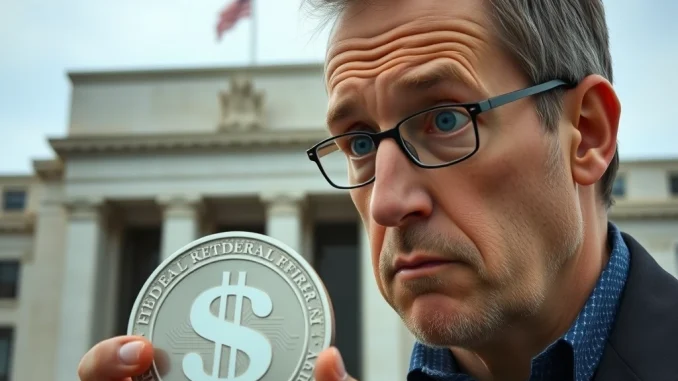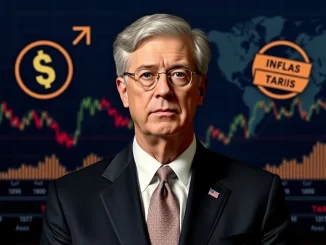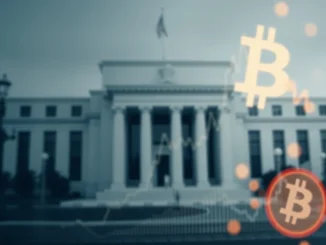
In a revealing statement that has sent ripples through the cryptocurrency world, U.S. Federal Reserve Governor Christopher Waller has voiced his strong opposition to the Federal Reserve adopting a digital currency. This declaration raises crucial questions about the future of digital finance in the United States and the potential implications for the broader crypto ecosystem. Are Waller’s concerns valid, or is the Fed missing a vital opportunity to innovate in the rapidly evolving digital age? Let’s dive deep into Waller’s perspective and explore what this means for the future of money.
Why the Federal Reserve Remains Cautious on Digital Currency
Governor Waller’s stance boils down to a fundamental question: is there a real need for a digital dollar? According to his recent remarks, the answer, for now, appears to be a resounding no. He argues that the impetus for a central bank digital currency (CBDC) has waned, suggesting a lack of compelling public demand. But is this assessment accurate? Let’s break down the key reasons behind Waller’s skepticism:
- Limited Real-World Demand: Waller believes there isn’t substantial public pressure or necessity for a digital currency issued by the Federal Reserve. He suggests that existing payment systems in the U.S. are already efficient and cater to the needs of consumers and businesses.
- Momentum Loss: He indicates that the initial enthusiasm and drive behind the digital dollar concept have diminished. This could be due to various factors, including regulatory hurdles, technological complexities, and shifting priorities within the Fed.
- Unclear Benefits: Waller likely questions the tangible advantages a digital dollar would offer over current digital payment methods. The Fed needs to be convinced that a CBDC would provide significant improvements in areas like efficiency, security, or financial inclusion.
While Waller’s perspective reflects a cautious approach, it’s essential to consider the counterarguments and the potential benefits that proponents of a digital currency often highlight.
The Potential Advantages of a Digital Dollar: What Are We Missing?
Despite Waller’s reservations, many experts and industry leaders believe that a digital dollar could bring about transformative changes in the financial landscape. Here’s a glimpse into the potential upsides:
| Benefit | Description |
|---|---|
| Improved Payment Efficiency | A digital dollar could streamline payment processes, making transactions faster and potentially cheaper, especially for cross-border payments. |
| Enhanced Financial Inclusion | CBDCs could provide access to digital financial services for underserved populations who currently lack bank accounts. |
| Reduced Transaction Costs | By eliminating intermediaries, a digital currency could lower transaction fees, benefiting both consumers and businesses. |
| Combating Illicit Activities | While controversial, some argue that a well-designed CBDC could offer better traceability and help in curbing illegal financial activities compared to cash. |
| Modernizing the Financial System | Introducing a digital dollar could position the U.S. at the forefront of financial innovation and maintain its global economic competitiveness in a rapidly digitizing world. |
Christopher Waller’s Perspective: A Closer Look at the Fed Governor
To understand the weight of Christopher Waller’s opinion, it’s crucial to recognize his position and influence within the Federal Reserve. As a Governor, Waller plays a significant role in shaping monetary policy and the Fed’s overall direction. His skepticism towards a digital currency carries considerable weight and could significantly impact the future trajectory of the digital dollar project.
Waller’s background as an economist likely informs his data-driven and pragmatic approach. He appears to prioritize demonstrable need and tangible benefits over speculative potential, which is a characteristic often associated with central bankers. His cautious stance highlights the rigorous scrutiny any major financial innovation faces within the Federal Reserve.
Is the Digital Dollar Dream Over? Analyzing the Road Ahead
Does Waller’s statement signal the end of the digital dollar conversation? Not necessarily. While his opposition is a significant hurdle, it’s important to remember that:
- Waller’s is one voice: The Federal Reserve Board consists of multiple governors, and their opinions may differ. The ultimate decision on a digital currency would require broader consensus.
- Ongoing Research: The Federal Reserve is still actively researching CBDCs and exploring their potential implications. Waller’s comments might reflect a current assessment rather than a permanent dismissal.
- Global Developments: Other countries are aggressively pursuing CBDCs. The U.S. might need to reconsider its stance to remain competitive and influential in the global financial system.
- Evolving Needs: The financial landscape is constantly changing. Future technological advancements or shifts in consumer behavior could reignite the demand for a digital dollar.
Actionable Insights: What Does This Mean for You?
For those involved in the cryptocurrency and digital finance space, Waller’s remarks serve as a chilling reminder of the regulatory uncertainties and the ongoing debate surrounding CBDCs. Here are some actionable insights:
- Stay Informed: Keep a close watch on developments related to CBDCs and regulatory discussions. The Federal Reserve’s stance can evolve, and staying informed is crucial.
- Engage in Dialogue: Participate in constructive conversations about the benefits and risks of digital currencies. Your voice and expertise are valuable in shaping the future of digital finance.
- Focus on Innovation: Continue to build and innovate within the digital finance space, addressing real-world problems and demonstrating the tangible value of decentralized technologies.
- Prepare for Scrutiny: Be prepared for ongoing regulatory scrutiny and adapt your strategies accordingly. Compliance and responsible innovation are key to long-term success.
Conclusion: The Digital Dollar’s Uncertain Future
Governor Christopher Waller’s skepticism injects a dose of reality into the digital dollar narrative. While his concerns about demand and necessity are valid, the potential benefits of a CBDC cannot be ignored. The future of the digital dollar remains uncertain, but the conversation is far from over. As technology advances and the global financial landscape evolves, the Federal Reserve and policymakers will need to continuously reassess their position and engage in open dialogue to ensure the U.S. remains at the forefront of financial innovation while safeguarding stability and consumer protection. The journey of the digital dollar is likely to be a marathon, not a sprint, filled with ongoing debates, research, and adaptation.



